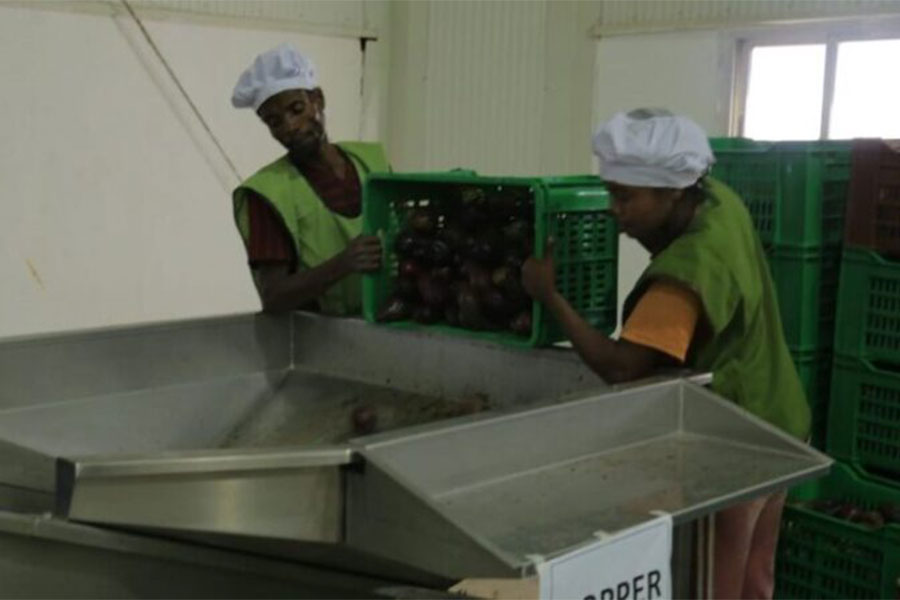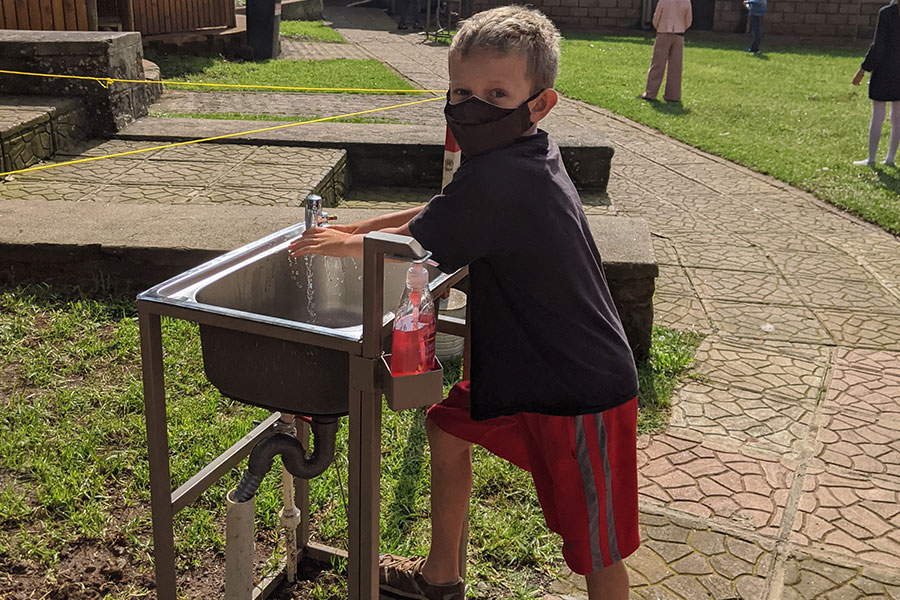
Fortune News | Jul 23,2022
On a cloudy morning one of the days last week, Genet Gebre was immersed in a pile of dirt searching for metal scrapes at the top of the Koshe dump site.
She does not seem to mind the reeking smell or vultures hovering around. A cold wind breeze takes the plastic bags into the air while three other women toil beside her on the wasteland.
Genet earns 500 Br weekly if she finds someone to buy the scrapes.
"This is what I do to get by," she told Fortune.
There was hardly a moment during her life she could call comfortable, as she was forced to take care of herself at a young age. She worked as a cleaner and housemaid until getting married three years ago. She is the breadwinner for the family, living in a one-room shabby house paying 1,000 Br rent.
Genet comes to the dumpsite every day, walking a distance of no less than 20Km to search for swarf and scrapes. She observes buyers have gone down and she has been saving up her collected metals until better days come along.
"I'm finding it difficult to find buyers these days," she said. "Even when I sell, the money is not enough."
Koshe is an open dumpsite in Addis Abeba established 60 years ago. It lies on 30hct land and 26m in height around the Jemo area. Close to 3,000 people hauled in the site, with some making their permanent residence.
Dumped waste is continuously layered on top of Koshe, creating cliffs. Experts warn internal heat from decomposed manure can reach up to 65 degrees Celsius risking a blowout.
In 2017, a treacherous landslide unfolded in the land of Koshe that was deadly for over 115 residents.
Authorities paved the way for rehabilitation projects the following year by installing a venting pipe system that reduces the heat inside by converting methane to carbon dioxide.
Methods such as creating compacted roads, increasing water runoff and reducing water leaks through the garbage have been implemented in partnership with the Japanese government.
"A palpable technology was missing," said Ephrem Sisay, landfill management directorate director at the site.
Ephrem has been managing the site for more than five years and observed that solid waste collection has increased over the years, attributing the upward trend to the decline of informal dumping.
Although the streets of Addis Abeba are far from reflecting the essence of a clean metropolitan city with wastes indiscriminately disposed inside drainage lines and roadsides, authorities disclose they got the hang of a good collection and disposal system.
Members of Addis-Meiraf Solid Waste Collectors Association around the Tor Hailoch area.
According to Ephrem, the proper waste collection and disposal rate in the capital has reached 85pc which stood at 43pc a few years ago. He observes plastic bottles are prominent on the site, with a 10pc increase last year.
Waste collection and disposal have become a means of making a living for many. An average of 2,500tns of waste is damped at Koshe daily, where 300 to 500 trucks make their way to the area to unload.
Elias Abdu daily unloads his truck at the Reppie garbage storage facility near the dump site. He has been working as a driver under Tigist & Gashaw Waste Collectors Association for seven years.
Elias did not have a previous job and found a monthly salary of 7,000 Br, unloading about 1,000tns of solid waste daily, a blessing in disguise.
"Traffic is the only hurdle," Elias told Fortune.
Reppie Waste to Energy Power Plant was constructed by China National Electric Engineering in 2018, commencing operation the following year.
Wastes are stored in the facility for up to three days and taken to the power plant, where 25pc is ash from heavy metals and dissolvable salts.
It was expected to generate 50MW power, but the plan could not be actualised as the power generation dwindled to only 25MW using two operational steam turbines.
At total capacity, close to 1,400tns of waste is processed in a day at a minimum temperature of 850 degrees Celsius, with the released heat generating superheated steam converting steam to electrical energy.
However, it has stopped power generation for almost two years because of a turbine breakdown, plummeting its overall waste combustion to 600tns a day.
"We've got a long way before generating proper power from waste," said Wubshet Haile, plant operational shift leader at Reppie.
According to Wubshet, they are waiting for the Chinese company to repair the turbines.
The facility has built Flue Gas Treatment (FGT) that consistently monitors emission levels and absorbs toxic greenhouse gases.
The waste production rate per person increases by five percent every year, with a person generating close to 0.5kg of waste every day.
Close to 70pc of Addis Abeba's waste is collected from households with over 7,000 collectors through 90 associations. The associations have created employment opportunities for more than 70,000 people.
The collectors go to households in the 118 woredas of Addis Abeba. The collected wastes are distributed to 216 temporary storage points in every district, which will be transferred to Koshe within the day.
Wastes from commercial facilities and factories constitute nine percent and are collected by close to 32 private companies directly taken to the dump site.
Around the Tor Hailoch area, seven men in yellow and orange uniforms covering half their faces are toiling effortlessly to put the collected waste in the bag.
Tolossa Holela gives orders to wrap up the process from the truck's passenger seat. He is the head of the Addis-Meiraf Solid Waste Collectors Association, with 31 employees under its fleet earning close to 4,000 Br a month.
The truck makes ten stops on the different sides of the woreda before making its way to the destination to the temporary storage facility in the district, before it is taken to the final dump site.
"It is a hefty work," said Tolossa.
The World Bank report suggests the lack of proper collection of containers and poor infrastructure exacerbated by a poorly designed collection route system has created hurdles in the solid waste collection system in the capital.
Alemayhu Habdisa (PhD), an environmental health lecturer at Jimma University, observes that population growth has been contributing to the detrimental waste generation rate in Addis Abeba.
According to Alemayehu, a high generation of solid waste through onion peels contributes to the age of methane gas, which contributes to the greenhouse effect. He recommends expanding dumping sites to different areas.
"There is a lack of planning and design on the waste management systems," he said.
Alemayehu warns that accumulated wastage in the city causes a deadly chemical found in soils and ponds known as Lichet that may contaminate the food commodities produced through irrigation.
He expects the river-side projects to sustain waste stocked around rivers used as irrigation for crop production, as there should be colossal care for waste contamination that could not haul onto rivers.
Samson Wakuma, public health assistant professor at Addis Abeba University, concurs. He observes that the city lacks proper disposal of waste that creates health impacts when transferred to river sides during flood season.
"It contributes to cancerous diseases," he told Fortune.
Research conducted by Ethiopian Public Health Insititute (EPHI) in 2017 shows Akaki river, due to its proximity to factories, has been endowed as one of the most polluted rivers in Addis Abeba. Toxic wastes, urban runoff, fuel storage, and disposal of chlorinated solvents have contributed to the contamination.
This has made life difficult for the surrounding dwellers who depend on the river to irrigate their vegetable patches and drink the river water.
Samson believes dumping sites should be as far from rivers with sanitary disposal systems as possible.
He recommends regulations to be placed in sorting out waste collections.
The Mayor's Office directorate responsible for monitoring services has been trying to oversee the waste management from collection to dumping. Officials dispatched 15 experts to create awareness to differentiate the disposals from disposable to bio-degradable to hazardous.
According to the Service Director, Mihiret Degife, they plan to create household awareness.
Urbanisation coupled with population growth has increased waste generation in the city, making it challenging for the City Administration to provide safe and sustainable solid waste management.
Over 60pc of the collected waste from the city appears to be organic, while five percent is recycled.
The Addis Abeba Cleaning Management Agency has been working to improve the waste management system by recycling, reusing and recovering collected wastes.
The Agency has been focusing on recycling waste materials attributing a high employment rate and revenue-generating capacity with a 1.1 billion Br budget for the year.
Bayush Tadesse, recycling & reuse head at the Agency, said there is an inclination towards recycling plastic bottles availing a high rate of employment in the last three years.
According to Bayush, the recycled number of plastics has shown a nine percent increase, with 49,000tns recycled in 2021, generating 141 million Br annually. Last year, plastic companies generated 254 million Br by recycling 64,000tns of bottles.
"Solid waste will be converted to resource in the long run," said Bayush.
Urban waste management has been a challenge in the developing world due to poor infrastructure and limited institutional capacity.
"Population in the capital has expanded greatly," said Girma Hailu, solid waste service director at the Agency.
The last national census was conducted 16 years ago, with the census commission reporting 2.7 million residents. In this period, Addis Abeba experienced several socioeconomic transformations that could contribute to extreme changes in demography.
"That has made it difficult to extract data on the city's waste generation," Grima told Fortune.
PUBLISHED ON
Mar 25,2023 [ VOL
23 , NO
1195]

Agenda | Oct 03,2020

Commentaries | Jun 27,2020

Commentaries | Oct 05,2019

Viewpoints | Aug 03,2019

Verbatim | Jul 17,2022

Dec 22 , 2024 . By TIZITA SHEWAFERAW
Charged with transforming colossal state-owned enterprises into modern and competitiv...

Aug 18 , 2024 . By AKSAH ITALO
Although predictable Yonas Zerihun's job in the ride-hailing service is not immune to...

Jul 28 , 2024 . By TIZITA SHEWAFERAW
Unhabitual, perhaps too many, Samuel Gebreyohannes, 38, used to occasionally enjoy a couple of beers at breakfast. However, he recently swit...

Jul 13 , 2024 . By AKSAH ITALO
Investors who rely on tractors, trucks, and field vehicles for commuting, transporting commodities, and f...

Oct 25 , 2025
The regulatory machinery is on overdrive. In only two years, no fewer than 35 new pro...

Oct 18 , 2025
The political establishment, notably the ruling party and its top brass, has become p...

Oct 11 , 2025
Ladislas Farago, a roving Associated Press (AP) correspondent, arrived in Ethiopia in...

Oct 4 , 2025
Eyob Tekalegn (PhD) had been in the Governor's chair for only weeks when, on Septembe...